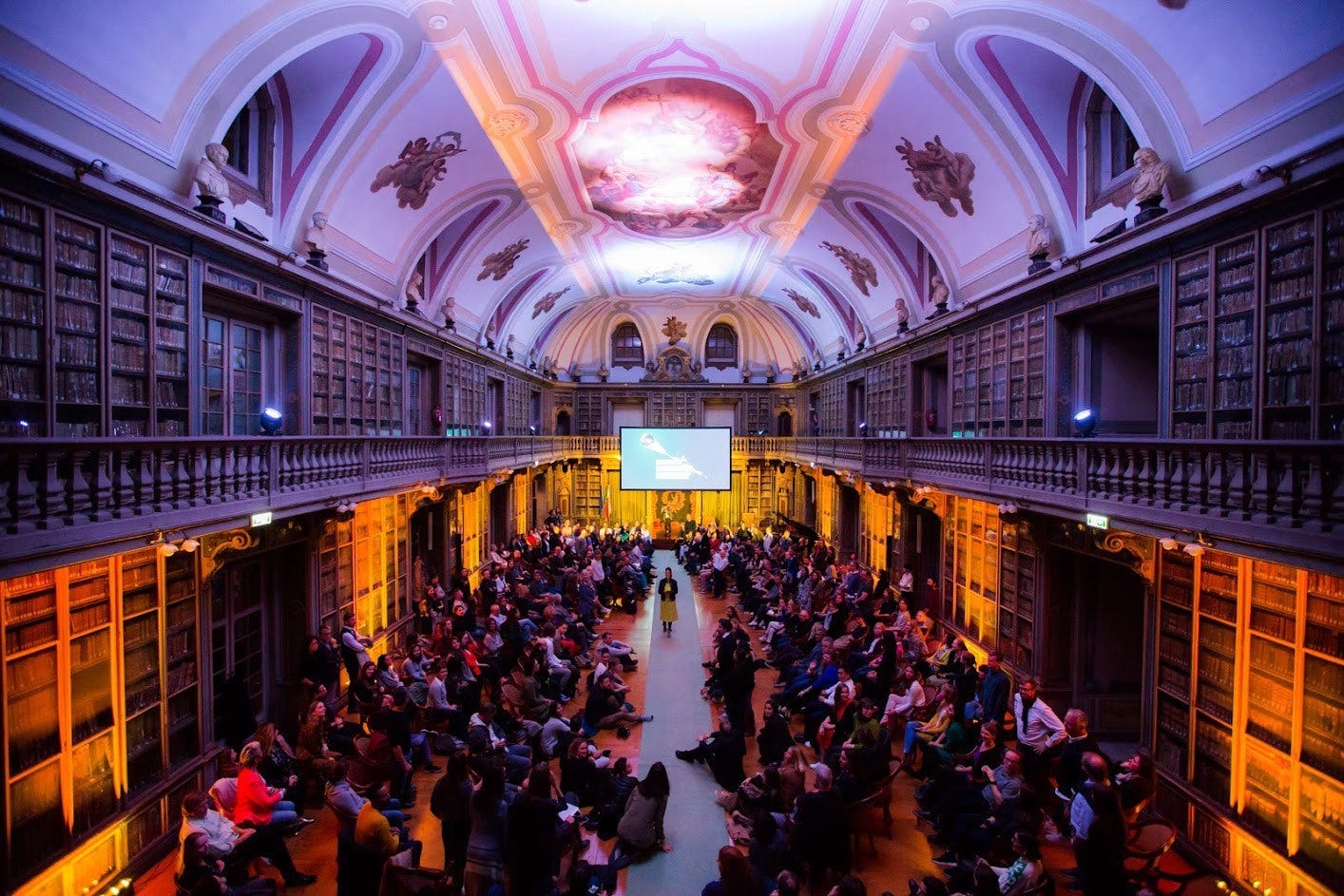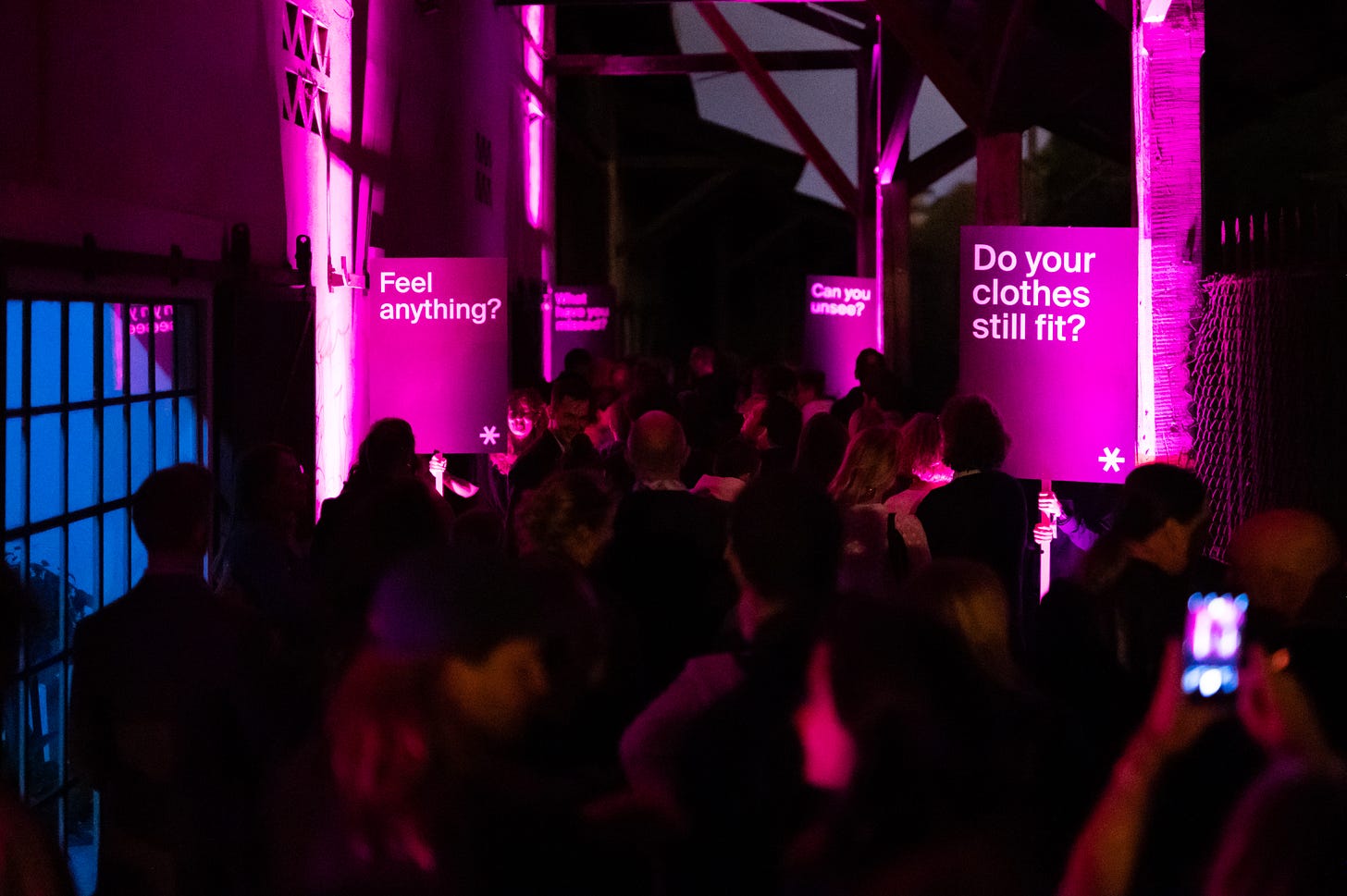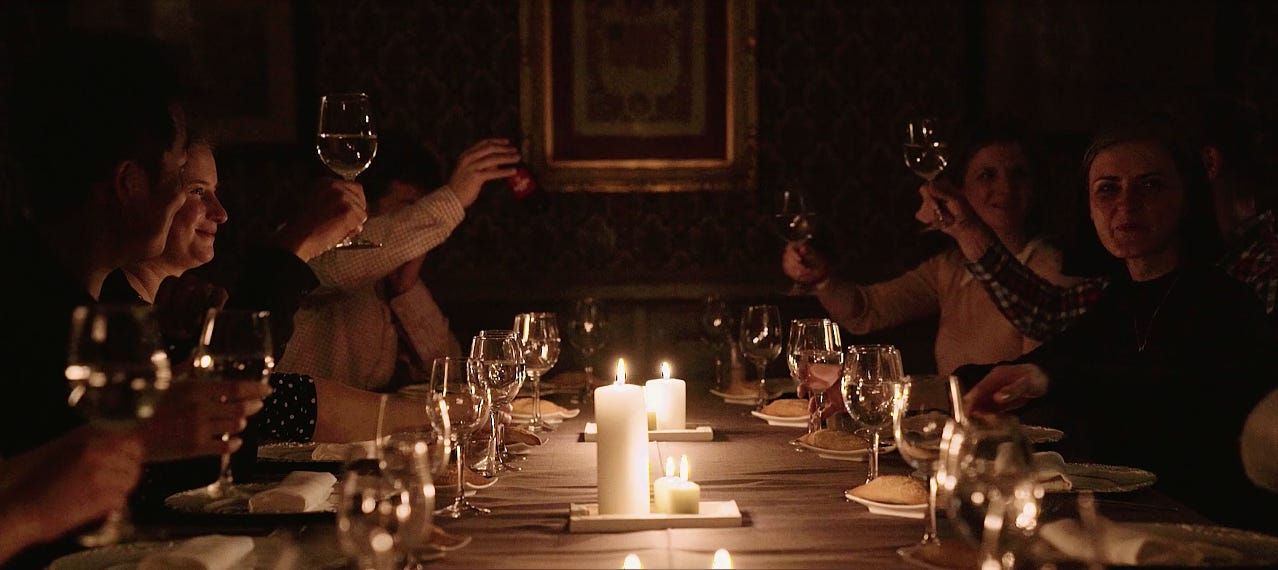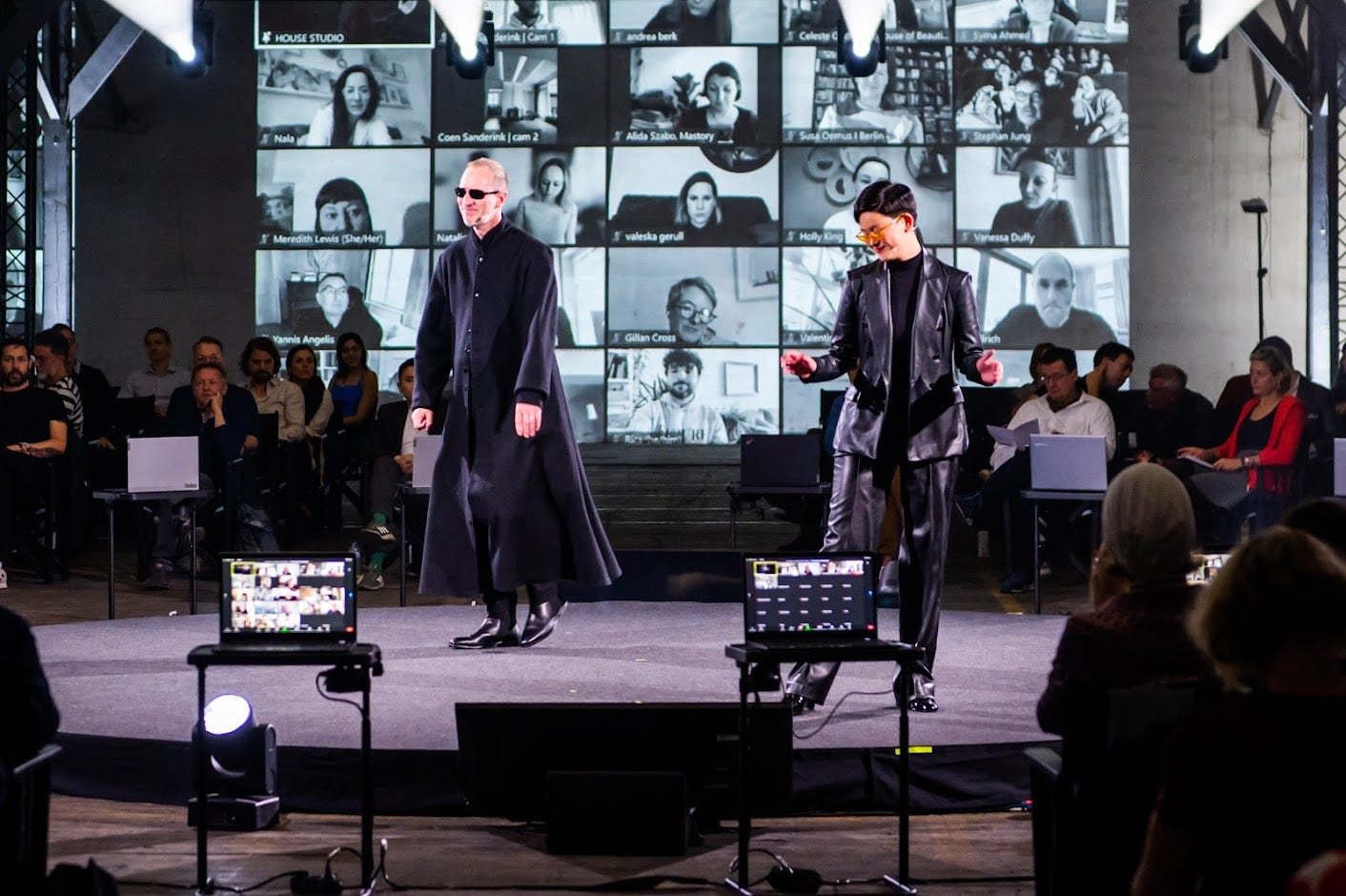Can Business Be Beautiful?
Tim was interviewed on silent dinners, 'coming alive' as a KPI, and poetry in corporate reports.
Field Notes
Welcome explorers!
Sometimes it seems that beauty – meaning art, design, dance, poetry, and philosophy – has no place in the day-to-day corporate world.
But in this month’s issue, we have a conversation with Tim Leberecht, who has made beauty his business by reimagining the experience of how professionals gather, from Davos to the dinner table.
Tim is a German-American author and entrepreneur, and co-founder and co-CEO of The House of Beautiful Business. His book, The Business Romantic, was an international bestseller. Previously, Tim served as the CMO of NBBJ, a global design and architecture firm, and the CMO of the product design and innovation consultancy Frog Design.

Christina Herbach [CH]: Hello Tim! I had the pleasure of first meeting you at the 2018 House of Beautiful Business in Lisbon. For me, that week redefined what a business conference – and a community – could be. Can you tell us what the House is, and how it has evolved over the years?
Tim Leberecht [TL]: The House began off the heels of my book the Business Romantic. The book’s subtitle was, “Give everything, quantify nothing and create something greater than yourself.” It was meant as an antidote against the obsession with data that was very prevalent at the time. And at the end of the book, I wrote, “By the way…This is also a secret society. Email me if you want to be part of it.” It was only meant to be tongue in cheek, but then to my great surprise, people reached out!
My co-founder and I decided we had to host an event in 2017 in Barcelona. We actually piggybacked off of the Mobile World Congress, which was this 100,000 person trade show happening on the other side of town. We were like a thorn in its side, this opposing counter space in a Gothic Quarter guild house.
The ambition was to host the most romantic business conference that the world had ever seen, so we worked with opera singers, we staged a silent dinner and an art exhibition. Everything was very imaginative, very whimsical, and very secretive. You walked into this mysterious space filled with wonder – yet at the same time, you exchanged business cards and met people that were relevant for your business.
It was meant as a passion project, but it struck a chord and and we quickly realized like that we were like onto something. Every year from then on, we’ve hosted an annual gathering. Our community now comprises 25,000 people, and we do much more now than just the annual event.

In the years since our inception, cultural paradigms have shifted as well. When we started, the idea of humanizing business was a much needed challenge to the mainstream thinking that big data, solutionism and engineering could save the world. A few scandals and tech failures later though, and the world has realized that Silicon Valley is not the answer. People have poked holes in human centered design too, and realized it can actually be part of the problem to have this self-centered perspective, all about convenience and humans. Now we know we need to take a broader view, of the whole ecosystem and even a planetary view.
Now The House is evolving once again. We call ourselves a network for the life centered economy. It’s about honoring all life, and it is built on three blocks:
- Sustainable living. Being in tune with the ecology, reconnecting with nature, long term thinking and everything that falls under that.
- New forms of intelligence. AI, of course, but also mixed reality and higher levels of consciousness through plant based medicine and spirituality
- Fully human. How do we show up at work with emotional diversity, with the full range of complicated emotions, the need for meaning, purpose and belonging?

[CH]: What an evolution. I started my career in analytics, and I agree that while big data and technology has a lot of answers, we often ask the wrong questions. We focus on “what” and “how”, but ignore the deeper “why”. I love that The House invites us to contemplate questions that are bigger than ourselves.
You alluded to this, but in addition to the annual gathering, your team also now consults with private clients to help them explore these big ideas. Can you tell us a bit about the experiences that you design for clients in your consulting work?
[TL]: That’s right. After Porsche, our seed investor, came on board, we began doing a lot of consulting work for corporate partners from Google to Salesforce, SAP to Airbus, Volkswagen, and many other big Fortune 500 brands.
We help these clients to develop thier vision and tell their stories. We design experiences that move people, not only intellectually, but also emotionally and somatically.
For example, we’ve been doing an executive development program for a German retailer for many years. Recently, we designed a session where the group simply spent a day walking through Berlin. Along the way, though, they had these seemingly serendipitous encounters we organized in advance. One was with a person experiencing homelessness, another was with a police officer.
These unexpected encounters help challenge people’s assumptions about the world. What does it mean to be homeless? Do you know how much work it is? One of the key takeaways was how structured the days are of a homeless person in Berlin according to the report of that person. The police officer shared insights about conflict resolution in public.
Another marquee experience we offer clients is silent dinners, which we use at the outset of meetings to create trust and a form of tenderness. Silence is particularly powerful because in business often we use language to attack or to defend. You assert an idea and then you defend, but in silence, all things are equal. You connect on a very different level and it’s quite moving.
[CH]: I love that and believe in the impact silence can have. Similarly, when my co-founders and I were running Bring Your Own Story, we hosted dinners in the dark. No one at the table knew each other, and everyone was blindfolded. As each person shared thier personal story, guests built up a picture of each other in the mind. But when the blindfolds come off, many were surprised by other guests’ races, abilities, appearances etc.
Now of course, this is an engineered, one-off experience, but revelations like those tend to seep into your life more generally. For example, perhaps you’re less likely to make a snap judgement when interviewing someone for a new role.
[TL]: It’s all about the power of constraints, right? By removing one sense, you sharpen all the other senses and and then you are enhancing presence, which is very much in this spirit of the House.

[CH]: Moving on to the why behind experience design, the ethos of this newsletter can be captured in two of my favorite quotes.
1. “I don’t believe people are looking for the meaning of life as much as they are looking for the experience of being alive.” – Joseph Campbell
2. “Don’t ask what the world needs; ask what makes you come alive, and go do it. Because what the world needs is people who have come alive.” – Howard Thurman
We seem to share this sentiment, that success can’t be fully captured by a definitive, quantifiable set of KPIs, but rather by whether you make people feel alive. Can you elaborate? How does The House help people come alive?
[TL]: People often come to us with a corporate mandate. The usual question is, “What’s the outcome? What do I present back to my team on Monday?”
We can come up with a lot of proven reasons: talent connections, business development conversations, new project leads. And that’s all true, but the real reason people come, whether they’re a CEO or are an intern, is because they want to feel alive. And our business is a powerful conduit for that. We give them an alibi, a container for having experiences that make them feel alive.
Like all people, our guests want to fall in love and to be loved. They want to become energized by ideas. They want to get to know themselves and others. They want extreme experiences. At the end of the day, I believe people want to feel alive and that’s the business we’re in.

[CH]: Why is this “coming alive” so important? If someone attends an event like the House, then goes back into the default world, what are the ripple effects?
[TL]: It’s all about expanding the playing field. People realize, “Wow, I’ve lived my life just within this sliver of what is possible.”
Business, and management in particular, tends to have a narrow, reductionist veneer. That’s what management is – the illusion of us being able to control life, manage it and take the risk out of it. But life isn’t manageable.
Psychologically speaking, we live our lives on a spectrum from complete safety to extreme daring. Of course, we all want to be safe, to rely on our partners and the people around us. But we also want drama, experiences that stretch, surprise and even hurt us. Those are two extreme poles and we’re all trying to find the right balance.
In designing experiences, we tend err on the side of adventure. Priya Parker says in her book (The Art of Gathering) that any gathering is an opportunity to create a different world, even just temporarily. It shows us the life that we could lead, and that’s deeply inspiring as we go back into our more calibrated day-to-day life that’s not so extreme. Ideally, we take some inspiration and recalibrate for our lives.
[CH]: That’s beautifully put. I’ve spent most of my career in business consulting, and I also have a deep love of poetry. But I was nearly 12 years into my career before I saw someone open an strategic plan with a poem. “You can do that?” It blew my mind!
Well, of course you can, but we tend to make business was cut and dry. Bringing the two together reminds us that we all have different ways of reading the world though. That’s obvious in a poem, but it’s also true for a financial statement.
[TL]: I totally agree. Have you heard people say we are living in VUCA times? It stands for volatile, uncertain, complex, and ambiguous. Poetry is like deeply ambiguous, and it shows us that the world is never binary. There’s always something between the lines, and there’s always shadow side to things. There’s no reason why we shouldn’t include that in business.

[CH]: You have a few core design principles or tenets that guide your experience design practice. For example, you always “Begin with mystery.” What are some of principles that you come back to over and over? How do they practically inform how you design the experience?
[TL]: We have a set of twelve principles for the House.
One is don’t waste time with efficiency. We deliberately create spaces that are excessive, where you might sit longer than normal. It’s like any party – when you stay a little bit longer, it’s usually the best moment.
Another principle of ours is to create a space where people can get lost, without losing. It’s giving people permission to be vulnerable so they can lose themselves, and lose control – without fear of being a ‘loser’ or being mocked or ridiculed.
I also love to say we are ugly, but we have the music. This is a lyric from Chelsea Hotel by Leonard Cohen. There’s no beauty if we don’t allow ourselves to be ugly at times, showing our true colors, going to where it hurts. To be authentic is to be ugly… but we have the music. So we create a way to lift us out of ugliness.
End in silence is another principle. We end our festivals with one hour of silence every time and it’s very very powerful.
More generally, we are very aware of the overall choreography and emotional arc. Every single detail matters. It’s like a pointillistic painting where every single dot builds up the picture. So we really debate every song between keynote talks on the mainstage at the conference. It’s a bit obsessive maybe, but we believe in it.

[CH]: One final question for all our Experience Explorer correspondents – what are three experiences, of any genre, that you recommend?
[TL]:
- Attend a football game. I just love going into the these modern arenas. They’re temples, they’re cathedrals and seeing 50,000 people in that space… it’s just an incredible experience. So whether you’re a sports fan or not, this is a spiritual experience that I really recommend.
- Make music collectively. I used to play in a band when I was younger and there’s something really beautiful about making music together. You learn a lot about collaboration, performing together. It doesn’t even have to be music, but to perform something together is to create life with other people. You realize there is something greater than yourself.
- Visit a cemetery. So funerals are really interesting, and I like cemeteries a lot as places of contemplation. It’s not for everyone, but it helps you shed light what’s the true purpose of it all and raises the big questions.
***
This interview was first published in Experience Explorer.